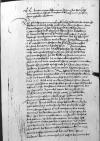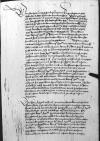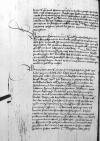Gestrigs tages ist beÿ unns E(uer) L(ieb) eigner diner mit derselbenn schreiben, ain dat(um) haltende ⌊Heilsbergk⌋ den XIX-t(en) Ianuarii gegenwerttigs scheinendenn virtzigstenn jares ankhomen, / daraus wir erstlichenn das E(uer) L(ieb) both, / welchenn diselb nach ⌊Crackaw⌋ abgeferttigt also lange undierwegen grosser wesserung halbenn vortzogenn. Danebenn, wes ⌊konig(lich)e ma(ieste)tt zu Polann⌋ etc., unnser gnediger herr unnd freuntlicher lieber ohem, E(uer) L(ieb) in der Denischen handlung zur antwurt gegebenn. Nichtsminder wiewol hochgemelte ⌊konig(lich)e ma(ieste)tt(en)⌋ in irer altenn kranckheit morbo articulari ann denn fussenn grosse wetung habe erlidenn, / sey es dannocht, Got lob in ewickeit, widerumb mit irer ma(ieste)tt(en) besser wordenn sampt angehofftem fernerm innhalt vorstandenn etc. /
Nun nhemenn wir E(uer) L(ieb) freuntlich nachbarlich anczeigen obberurther punct halbenn / zu hohem danck ahnn. / Mit erpittung widerumb in nachbarlicher freuntschafft zuvorgleichenn / unnd sein, / dieweil unns zuvornn ⌊konig(liche)r ma(ieste)tt(en)⌋ schwacheit mitt beschwertem gemuth bewust gewesenn, / derselbenn gesuntheit umb sovil dest erfrewter denn Almechtigenn embsigs vleis bittende, / er wolle seiner konig(liche)n ma(ieste)tt(en) nicht alleint die grossenn schmertzenn entnhemenn, / sonder dieselb zu trost unnd schutz der loblichenn ⌊Cronn zu Polan⌋ mit aller derselbenn eingeleibtenn unnd zugehorigen landenn unnd leuthenn in langwiriger gesuntheit, / fridlichem Cristlichem regiment gnediglichenn erhalten. /
Das ⌊konig(lich)e ma(jeste)tt⌋ uff E(uer) L(ieb) unnd anderer ⌊⌊koniglichs teils Preussenn⌋ stende⌋ vleissigs anlangen unnd gemeÿnem fried zu guth ire stadtliche botschafft ann ⌊Ro(misch)e konig(lich)e ma(ieste)tt(en)⌋ abgeferttigt / unnd dieselbige / uff das / durch ire / beÿ ⌊Romischer kay(serliche)r ma(ieste)tt⌋ gnedige vleÿssige farderung / krige unnd unneÿnigkeit unnder denn cristlichen furstenn auff gehabenn vermanenn thun. / Daneben dis stucks halbenn ann ⌊Ro(misch)e kay(serlich)e ma(ieste)tt(en)⌋ ins vleissigst sampt ungehofftem konig(liche)m erbithenn auch schreiben lassenn. / Thun wir unns gegenn E(uer) L(ieb) vonn wegen gehabter muhe unnd arbeit gantz freuntlichenn bedanckenn / unnd wollenns ahnn denen orthen,  BCz, 1606, p. 322 da es E(uer) L(ieb) zu gnad, ehrenn, rumb unnd allem guthen gereichen solle, / nicht vorschweigenn, / trostlicher hoffnung der liebe Gott / werde durch vorleihung seiner gottlichenn hilff unnd anleÿtung ⌊konig(liche)r ma(ieste)tt zu ⌊Polann⌋⌋, / als des friedliebendenn und eldestenn konigs / die bedenn hohenn heupter zur neÿgung gemeÿner Cristlicher einigkeit wenden. / Was aber dem weitters volgenn, / wird die zeit an tag unnd mit sich prengenn.
BCz, 1606, p. 322 da es E(uer) L(ieb) zu gnad, ehrenn, rumb unnd allem guthen gereichen solle, / nicht vorschweigenn, / trostlicher hoffnung der liebe Gott / werde durch vorleihung seiner gottlichenn hilff unnd anleÿtung ⌊konig(liche)r ma(ieste)tt zu ⌊Polann⌋⌋, / als des friedliebendenn und eldestenn konigs / die bedenn hohenn heupter zur neÿgung gemeÿner Cristlicher einigkeit wenden. / Was aber dem weitters volgenn, / wird die zeit an tag unnd mit sich prengenn.
Wes herrenn ⌊Hieronimum Laski⌋, / das derselbige in die ⌊Turckeÿ⌋ gekhomenn unnd alda gefenglich angenhomen solle sein / antrifft ist unns in warheit, / des wir mit Gott betzeugenn, / des guttenn herrenn ungeluck nicht lieb gonthenn ime aber vil ein bessers. / Dieweil unns dann unwissendt, wes berurts herrnn ⌊Laskÿ⌋ handlung in der ⌊Turckeÿ⌋ seÿ, / frid oder unfrid zu machen hidden by binding⌈[n]n hidden by binding⌉, so wirds sonder zweiffels der Almechtige allerseitzs das jenige dahin, / dartzu es ime nach seinem vetterlichen willenn gefellig, / richten.
Wie unns ferner E(uer) L(ieb) in eÿnem eingelegtenn zedel, / wes diser tag ann diselb / der edell unnd erenvhest unser besonder lieber ⌊Stanislaus Koskenn vonn Stangenbergk⌋, ⌊konig(liche)r ma(ieste)tt(en) zu ⌊Polann⌋⌋ etc. schatzmeister der ⌊Land Preussenn⌋ uff ⌊Marienburgk⌋ etc. in sachenn, den edlenn unnd erenvhestenn auch unnsernn besondernn liebenn ehrnn ⌊Achatium Zemenn⌋, Dantzkernn castellhann, erbling zu ⌊Crisburg⌋ unnd heuptman zum ⌊Stum⌋, / unnd inenn betreffende geschriebenn, / ubersendet, / bithennde derselbenn unnsernn rathe auff das der unlust zwuschenn inenn nicht weither einrisse / mitzutheilenn / unnd auff ir nechst schreibenn zu antwurthenn. /
Demnach gelangt ann E(uer) L(ieb) unnser freuntlichs nachbarlichs bithenn, / dieselb wollenn des vortzugs langsamenn antwurtens halbenn / auff die vorigenn schrifftenn keynunsfallen tragenn dann ebenn zu dyser zeit, / als ewer diner ankhomenn ist solch unnser antwurt vorferttigt gewesenn, / die wir E(uer) L(ieb) beÿ eignem bothenn ubersendenn haben wollen. Nachdem aber gleich  BCz, 1606, p. 323 E(uer) L(ieb) diner mitein khomenn ist ime die berurthe antworth auff denn erstenn brieff mit zuhandenn gestelt wordenn. /
BCz, 1606, p. 323 E(uer) L(ieb) diner mitein khomenn ist ime die berurthe antworth auff denn erstenn brieff mit zuhandenn gestelt wordenn. /
Nu befindenn wir im anfangk solchs zedels, / das benenter ehr ⌊Kostkenn⌋ fur sich selbst in einer andern sachenn / denn erwirdigenn in Got auch unnserenn besondernn liebenn freundt herrnn ⌊Johansenn(!) bischoffenn zu Colmensehe⌋ unnd inen betreffende E(uer) L(ieb) zugeferttigt unnd horenn unngernn, das sich bede theil auch in unwillenn einlassenn / zweÿffelnn nicht, / E(uer) L(ieb) werdenn in solchem / des zu frid und einigkeit dinstlich das ire auch dabeÿ thun. Zum andern vorstehenn wir, / das sich offtgedachter ehr ⌊Costkenn⌋ nicht wenig uber ehr ⌊Zemen⌋, / als solt ehr derselbige seinenn bothenn / zu des Kostkenn dinernn genn ⌊Marienwerder⌋, / da sie in bestrickung gelegenn, gesant unnd mit vordrislichenn worthenn anreden. / Desgleichenn selbst etzliche ⌊rede zu Grandenitz(!)⌋ dem ⌊Coskenn⌋ zu vorcleinerung / vonn sich vornhemenn solle habenn lassenn. / Worauf ist unns solche beder herrnn unneinickeit aus vilerleÿ bedenckenn nicht lieb unnd khönnenn bey unns nachdem wir (wie E(uer) L(ieb) selbst auch wissenn) berurthenn ⌊Zemen⌋ einer grossernn vorsichtigkeit unnd meres verstandts erkant / nicht erachtenn, / worumb es bescheenn, / das ehr Zehmenn imandts vonn denn seinenn / auff seinenn bevelich solche worth zu des ⌊Kostken⌋ dinern zuredenn abgeferttigt habenn soltt. Inn anmerckung, das sie zur sachenn wenig dinstlich / unnd lassenn unns bedunckenn, / das die theil bederseits villeicht altzuvil und baldt auff einander glaubenn unnd were unnsers erachtenns vil besser, / dem handell auch nutzlicher, / das kein theil denn angebendenn nicht also leichtlich stad gebenn, sonder allewegenn / die reden ehr erfharenn weder gleubenn thetenn. /
Dieweil wir dann E(uer) L(ieb) inn dem andrenn unnserenn schreibenn disfals unnser gutbedunckenn mitgeteilt, / dabeÿ wir es auff dismal beruhenn lassenn. / Dann einmhal gut wehre, das mann das  BCz, 1606, p. 324 jenige vornhemenn unnd volczihenn thet. / Welchs ⌊konig(liche)r ma(ieste)t zu ⌊Polann⌋⌋ etc. unnd vilenn stendenn daselbest gefellig auch landenn unnd leuthenn nutzlich, / dorann dan / unnserem vorigenn erbithenn nach / unnsers teils kein vleis mangelnn solle, / unnd sein E(uer) L(ieb) disfals weitter bedenckenn freuntlich gewerttig. / Wolten auch E(uer) L(ieb) vilstimptenn ehrnn ⌊Achatio Zemenn⌋, / vonn des ehrn ⌊Kostken⌋ ann E(uer) L(ieb) ausgegangnen schrifft(en) ichts doraus zuerfarenn, wes ehr dorann gestendig oder nicht / eroffnenn, / stellenn wir inn on the margin⌈inninn on the margin⌉ E(uer) L(ieb) als des hochvorstendigenn weither bedenckenn. / Unnd habenn derselbenn solchs, der wir zu aller freuntlichenn wolthettigenn nachbarschafft mit willenn geneigt, / auff ÿr schreibenn in antwurt hinwider vormeldenn wollenn.
BCz, 1606, p. 324 jenige vornhemenn unnd volczihenn thet. / Welchs ⌊konig(liche)r ma(ieste)t zu ⌊Polann⌋⌋ etc. unnd vilenn stendenn daselbest gefellig auch landenn unnd leuthenn nutzlich, / dorann dan / unnserem vorigenn erbithenn nach / unnsers teils kein vleis mangelnn solle, / unnd sein E(uer) L(ieb) disfals weitter bedenckenn freuntlich gewerttig. / Wolten auch E(uer) L(ieb) vilstimptenn ehrnn ⌊Achatio Zemenn⌋, / vonn des ehrn ⌊Kostken⌋ ann E(uer) L(ieb) ausgegangnen schrifft(en) ichts doraus zuerfarenn, wes ehr dorann gestendig oder nicht / eroffnenn, / stellenn wir inn on the margin⌈inninn on the margin⌉ E(uer) L(ieb) als des hochvorstendigenn weither bedenckenn. / Unnd habenn derselbenn solchs, der wir zu aller freuntlichenn wolthettigenn nachbarschafft mit willenn geneigt, / auff ÿr schreibenn in antwurt hinwider vormeldenn wollenn.
 BCz, 1606, p. 322 da es E(uer) L(ieb) zu gnad, ehrenn, rumb unnd allem guthen gereichen solle, / nicht vorschweigenn, / trostlicher hoffnung der liebe Gott / werde durch vorleihung seiner gottlichenn hilff unnd anleÿtung
BCz, 1606, p. 322 da es E(uer) L(ieb) zu gnad, ehrenn, rumb unnd allem guthen gereichen solle, / nicht vorschweigenn, / trostlicher hoffnung der liebe Gott / werde durch vorleihung seiner gottlichenn hilff unnd anleÿtung  BCz, 1606, p. 323 E(uer) L(ieb) diner mitein khomenn ist ime die berurthe antworth auff denn erstenn brieff mit zuhandenn gestelt wordenn. /
BCz, 1606, p. 323 E(uer) L(ieb) diner mitein khomenn ist ime die berurthe antworth auff denn erstenn brieff mit zuhandenn gestelt wordenn. /
 BCz, 1606, p. 324 jenige vornhemenn unnd volczihenn thet. / Welchs
BCz, 1606, p. 324 jenige vornhemenn unnd volczihenn thet. / Welchs 



